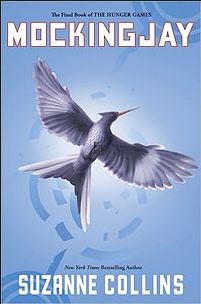Bookworms: Mockingjay (2010) by Suzanne Collins
 The way Katniss Everdeen survived her first Hunger Games made her a heroic figure to the oppressed masses and an enemy of the Panem government. As the revolution gathers momentum, the government begins to attack the people. Defeat would mean certain death for everyone involved in the uprising. The rebels need Katniss to be their symbol to inspire the revolution. Katniss must become their Mockingjay.
The way Katniss Everdeen survived her first Hunger Games made her a heroic figure to the oppressed masses and an enemy of the Panem government. As the revolution gathers momentum, the government begins to attack the people. Defeat would mean certain death for everyone involved in the uprising. The rebels need Katniss to be their symbol to inspire the revolution. Katniss must become their Mockingjay.
Author Suzanne Collins creates some interesting parallels with the previous books as Mockingjay continues with idea of morally grey areas and oppression. The rebels have a president only a fraction less frightening than Panem’s cruel President Snow. In this supposedly free district people have a schedule printed on their arm, food intake is strictly controlled and punishments for minor infractions are severe. As the war progresses the tactics of the rebels and the government begin to blur. Katniss, the face of the revolution, is possibly even more of a political pawn than she was when fighting for her life in the arena.
Mockingjay is a good book, but maybe towards the end it loses some of the energy that featured so heavily in the trilogy as things almost trail off. Katniss, the narrator of the story, is unconscious as some of the climactic scenes unfold. Instead of the dramatic present tense seen in the rest of the series, Katniss almost gives a detailed summary. The love triangle between Katniss, pretend and sometime real romantic interest Peeta and childhood friend Gale continues in the background and is slightly glossed over as Katniss makes a choice that could almost be by default.
There are a few things in Mockingjay that people may find it a little odd. Maybe there was some thought about the movie potential as one chapter has a training montage. Katniss wears a protective Mockingjay costume and fires rocket arrows from a bow that responds to her voice as things skirt around superhero territory. It’s fun but strange to see it in such a serious book.
After reading the first two books I needed to read this for closure, and once I accepted some of its quirks I found there was a lot to like about it. Collins makes some points about the media, celebrity, the power of television and war which could provoke a lot of thought and discussion.